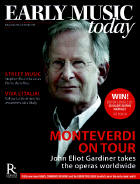Texte paru dans: / Appeared in: |
|
|
Evaluation: |
Outil de traduction ~ (Très approximatif) |
|
Reviewer: Andrew Green Why bother to review a new recording from The Tallis Scholars? You know just what you’ll find – damn near perfection (how startling is any tiny blemish!) in tuning, balance, phrasing, blend, pacing, dynamic range – and anything else you care to mention.
Well, for one thing, maintaining such quality can never be taken for granted. Meeting expectations, not least in complex and demanding repertoire such as this, is immensely taxing. Reputation brings pressure. More than that, this latest volume in the Tallis Scholars’ survey of the Josquin Masses adds to the accumulation of evidence demonstrating in modern times what the composer’s contemporaries knew only too well: that here was a genius.
Yes, these are early works — the Missa Une mousse de Biscaye may be the first of Josquin’s Masses, from the mid-1470s. Yet the stamp of mastery is unmistakeable. Yes, at times the music is austere and cerebral — more singers’ than listeners’ music. But then come such blazes of sound as in the Crucifixus of the Missa Di Dadi to send the senses spinning.
Both works have intriguing secular backgrounds — the Missa Di dadi apparently reflecting the love of the dice enjoyed by one of Josquin’s several employers, the Duke of Milan; the Missa Une mousse de Biscaye based on a tune reflecting the confusion when two lovers — one French, the other Basque — can’t communicate. Given time and space, it’s music that draws the listener in, ‘killing care and grief of heart.’
|
|
|
|
|
|
Cliquez l'un ou l'autre
bouton pour découvrir bien d'autres critiques de CD |
|




